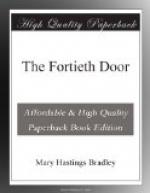CHAPTER XVI
OUT OF THE DARKNESS
There was no measure of time for Ryder in that walled coffin of death. The seconds seemed hours, the minutes ages.
He drew quick, short breaths as if economizing the air that was so soon to fail him; he tugged at his bonds till the veins rose on his forehead, but the silk held and the confines of the prison permitted him no room for struggle; then he leaned forward, to press with all his might upon the bricks before him; he grunted, he sweated with the agony of his exertions, but not a brick was stirred, not a crack was made in the mortar that gripped them tighter every instant.
He died a thousand deaths in the horror that invaded him then. Already he felt strangling, and the painful pumping of his heart seemed the beginning of the end.
Cold sweat stood out all over him; it ran down his face in trickling streams and his body was drenched with that clammy dew of fear.
He tried to count the minutes, the hours, to estimate how long he would hold out....
And then he heard his own voice saying very distinctly and clearly and dispassionately, “This thing is absurd.”
It was absurd. It was idiotic. It was utterly irrational. It was an impossible end for an able-bodied young American, an excavator of no mean attainments, a young scholar and explorer of twentieth century science, a sane, modern, harmless young man, to die immured in the ancient walls of a Turkish palace—because he had invaded a marriage reception and intervened between man and wife.
Violent death in any form must always appear absurd to the young and energetic. And the fantastic horror of his death removed it definitely from any realm of possibility. The thing simply could not happen.... He thought of the amazement and the incredulity of his friends....
Dangers in plenty they had warned him against, to his youthful amusement—sand storms and chills and raw fruit and unboiled waters, but they had not warned him against veiled women and the resentments of outraged lords and masters.
He thought of his mother’s consternation and dismay. He thought of his father’s stern amazement.... What an awful jolt it would give them, he reflected, with an irrational tickling of young humor.
But no, it would not. They would never know. Not a word of this fate would percolate into the world without. Not a comment upon his true end would enliven the daily columns of the East Middleton Monitor. Never would it regret the tragic and romantic interment of a young native son of talent, buried alive by a revengeful general of the Sultan....
He amused himself by writing the paragraph that would never be written. Then he told himself that he was lightheaded and hysterical and that he had better wonder what would actually be written. What explanation would be found?




